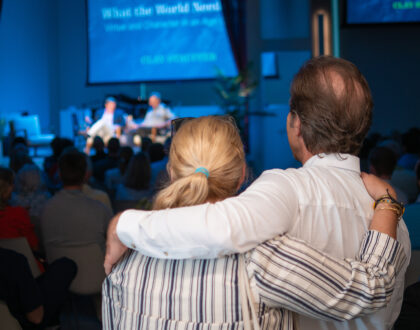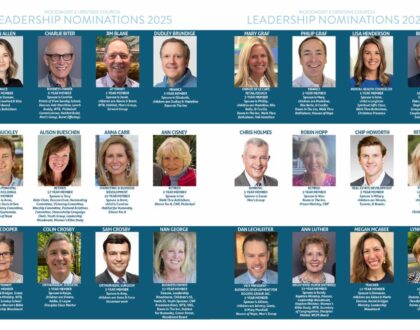Self-Awareness Strengthens Relationships

Hunter Mobley will be back to speak in the Woodmont chapel at 6:15 p.m. this Wednesday night, Feb. 5, on “The Enneagram, Love, and Relationships.” Consider this an early Valentine’s event with a dinner before in Drowota Hall at 5:30 p.m.
It’s been said before that we are mysteries unto ourselves. Many people lack self-awareness in our culture. The Apostle Paul writes to the Romans: “I do not understand my own actions, for I do not do what I want but I do the very thing that I hate.” In other words, we often know what we should do but we fail to do it. Why? Could it be that we need to gain a deeper understanding of ourselves? Who we are? What motivates us? What challenges us? What scares us? How do we behave in times of stress and strength? How do we see the world? How do others see us? These are all important questions as we seek to live spiritually and form meaningful relationships with other people. The quality of our relationships will always determine the quality of our lives. Also, our relationships play a big role in our faith development and journey.
The Enneagram is an ancient personality typing system. It is over 2000 years old but it was not actually written down until the 1970’s. It helps us come to terms with our own personalities and “why we do what we do.” Our personality is the way we cope in the world and it often hides our true essence – who God created us to be. According to Ian Morgan Cron and Susan Stabile, everybody has one number (personality type) and it was determined by the time we were five years old. However, we will certainly resonate with one or two other numbers and may have a hard time determining exactly what our number is. Here are the NINE different personality types:
TYPE 1 The Perfectionist – Ethical, dedicated, and reliable, they are motivated by a desire to live the right way, improve the world, and avoid fault and blame.
TYPE 2 The Helper – Warm, caring, and giving, they are motivated by a need to be loved and needed, and to avoid acknowledging their own needs.
TYPE 3 The Performer – Success-oriented, image-conscious, and wired for productivity, they are motivated by a need to be (or appear to be) successful and to avoid failure.
TYPE 4 The Romantic – Creative, sensitive, and moody, they are motivated by a need to be understood, experience their oversized feelings, and avoid being ordinary.
TYPE 5 The Investigator – Analytical, detached, and private, they are motivated by a need to gain knowledge, conserve energy, and avoid relying on others.
TYPE 6 The Loyalist – Committed, practical, and witty, they are worst-case scenario thinkers who are motivated by fear and the need for security.
TYPE 7 The Enthusiast – Fun, spontaneous, and adventurous, they are motivated by a need to be happy, to plan stimulating experiences, and to avoid pain.
TYPE 8 The Challenger – Commanding, intense, and confrontational, they are motivated by a need to be strong and avoid feeling weak or vulnerable.
TYPE 9 The Peacemaker – Pleasant, laid back, and accommodating, they are motivated by a need to keep the peace, merge with others, and avoid conflict. (Cron & Stabile, The Road Back To You, pp. 25-26)
No one personality type is better than any other, just different. We live in a world where, perhaps more than ever before, people need to work towards understanding each other better in marriages, families, neighborhoods, churches, politics, and business. We are often quick to judge and slow to listen. There is a lot of anger, fear, and hostility in our culture. The Enneagram has the potential to open our eyes so that we can live more peacefully and better “love our neighbors as ourselves.” Also, real spiritual growth happens when we come to terms with our shortcomings and flaws and make an intentional decision to strive to be better.
Recommended Posts

Healing, Growth, & Renewal Over Time
May 30, 2025

Values for Our Graduates
May 20, 2025

Leading in the Church
May 16, 2025

